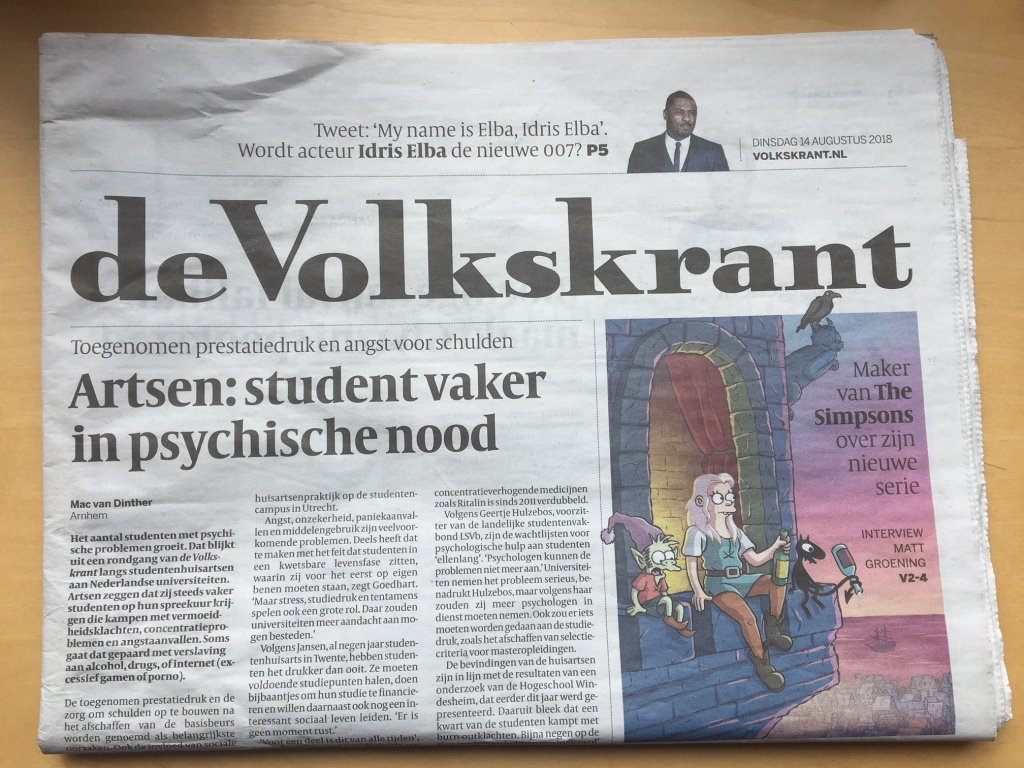For students
The tendency that the mental stimuli surpass the mental capacity more and more, is not only noticeable in the business world. Also the students experience nowadays more and more mental overload. Research even shows that personal circumstances are nowadays the main problem why students end their study and not study related things.
Meditation is an effective means to an end to cope better with the most important challenges and problems the contemporary student runs into and Meditatie Amsterdam has a program that is specifically aimed on students to help them.
Send me an email at roel@meditatie.amsterdam for more info or to apply, or use the contact area below!
The current student life is very challenging

The front page of the Volkskrant opened on the 14. of August 2018 with this article: ‘Doctors: student more often in psychological trouble’.
In this article student doctors declare they see more and more students in their practice that have problems with fatigue, concentration, anxiety and addictions and the waiting lists for mental care increase in length.
Also student psychologists found this tendency. Research in 2016 with 35 Dutch student psychologists, at among others the HvA and Uva, showed that the number of students that seeked for help increased, de waiting time for treatment at student psychologists grew and the problems among students became increased in complexity (source). Research by the RIVM and CBS out of 2019 found that the mental health of young people decreased over the last decade (source).
A lot of people don’t understand that the life of a student is that challenging. Even their parents often have pleasant memories about their student years where there was a lot of freedom, a more than sufficient financial support from the government and social media and the smartphone didn’t exist yet. The circumstances have changed though and this is probably the most challenging time in history to be a student. The opportunities are enormeous, but that is also the case for the stress to choose from all the options, the expectations and the stimuli students have to cope with and the financial support has diminished strongly.
Studying became top sport and it is often very hard to remain the balance.
Some data about the health of students:
- 51% of students have psychological problems and 12% severely (source: RIVM)
- students experience a lot of stress (62%), loneliness (80%), pressure to perform (76%) and sleep problems (41%) (source: RIVM)
- 54% copes with moderate to severe anxiety and depression (source: Study of study climate, health and study success)
- 52% skips social- or other activities for financial reasons (source: IOS)
- 25% has burn-out problems (source: Study of study climate, health and study success)
- 29% has problems to concentrate (source: Student Health Test)
- 25% copes with fear of failure (source: Student Health Test)
- 55% returns home tired after day at school and 45% goes there fatigued (source: TimeOut research)
- 75% is often or very often emotionally fatigued (source: National Union for Students)
- 73% of students that make debts for studying experiences pressure or health problems because of that (source: IOS)
The problems are mainly caused by not-study-related factors
The most important ones are:
- Stress of choice between and within studies
- Expectations by parents and society
- Often the first time of being independent and having to deal with life alone
- Finding a place of residence
- Governemental diciscions like about ‘leenstelsel’
- Financial worries for now and for high debts in the future
- Pressure to already during the study building a good resume to increase chances on a job in a difficult job market
- Participation pressure for a rich social life, also online
- The big role of screens and social media nowadays
As mentioned, researchers come to the conclusion that ‘personal circumstances are nowadays the main reason why students quit their study and not so much study related factors’.
The government has issued for the college year 2018-2019 two changes to reduce the psychological pressure for first year students by making the college fee half and having less firm regulations to collect all study points by exams.
Experienced pressure to achieve is high and possible to influence
According to the rapport Public health and exploration of the future 2018 of the Governmental Institute for Public Health and Environment, the experienced pressure to achieve among young people was already 78% in 2014 and their more recent research showed it further increased by the recent developments. The expectation is even that mental problems will have a steeper increase the next 25 years than cancer and heart disease, even with the population becoming older on average.
The experienced pressure and stress that occur by that are the main reasons for mental problems. This experienced pressure isn’t objective though. It is subjective and therefore trainable. Just like stress resistance it can change by training in meditation.
Is meditation effective to help the student with the most important problems and challenges of this time and society?
Yes!
Top business people like before Steve Jobs, companies like Google, Apple, SAP and Twitter, top athletes like Novak Djokovic, the Formula 1 racing team of Mercedes and even the elite units of armies use meditation to come to optimal performance and often mainly under pressure. Next to that the effects present itself for centuries already in real life and the last decades also are backed up by scientific research. On the page Research you will find studies that come to the conclusion that meditation has a positive effect on stress, burn-out, anxiety, depression, suicidal thoughts, fatigue, the ability to concentrate, worrying and addictions. Also you will find scientific articles that meditation increases the functioning of the brain, memory capacity and learning ability and that within a few weeks there can be measurable structural changes in the brain by meditating.
There are even studies done under specifically students and they show that meditation brings (an overview which is updated until 2019, after that a lot more studies were published that back this up):
Less stress
- Erogul 2014 – Ratanasiripong 2015 – de Vibe 2015 – Bamber 2016 – Burger 2017 – McConville 2017 – Schwind 2017 – Stillwell 2017 – Sweeny 2017 – Borchardt 2018 – Delgado-Pastor 2018 – de Vibe 2018 – Riet 2018 – Galante 2018
Less study stress
Less anxiety problems
Less depression
Less burn-outs
Reduction of multiple mental problems
More relaxation
Less worrying
Dealing better with emotions and problems
Better acceptance of circumstances
More self-awareness and self-compassion
Higher mental wellbeing
Improved attention
Less being distracted
Increased mental/cognitive functioning and achievements
- Singh 2012 – Mrazek 2013 – Colbert 2013 – Morrison 2013 – Ramsburg 2013 – Quach 2016 – Burger 2017 – Schrootsma 2017 – Saoji 2017
Clearer perception
The students with the most neurotic tendencies showed the biggest improvements towards (study)stress and general wellbeing (de Vibe 2015) and even after six years effects like less stress, more wellbeing and a higher problem solving capacity wer still measurable (de Vibe 2018). The studies above even show that meditation is for students more effective against depression than physical exercise (Alsaraireh 2017) and brings a bigger increase in cognitive functioning than yoga (Quach 2016). Also one meditation session brought more stressreduction and relaxtaion than distraction (reading a book) of just sitting quietly (Borchardt 2018) and for more mental calmness and creativity than a ‘fake meditation’ or not doing anything (Schrootsma 2017) . The studies also show that meditation is more effective than rest or relaxation exercises when it comes to dealing with conflicts (Fan 2014), creativity (Ding 2015), the social connection with others (Aspy 2017) and the improvement of cognitive achievements (Ramsburg 2013 – Saoji 2017).
Quick results
The results mentioned here can occur quickly. Within two months of meditating there are already measurable reductions in stress (Erogul 2014 – Schwind 2017 – Galante 2018) and specifically study related stress (de Vibe 2015), anxiety (Schwind 2017) and being distracted (Morrison 2013). Also research shows an increase of the mental capacity (Morrison 2013) and self-compassion (Erogul 2014) in this period of time. Three weeks of meditation for only 35 minutes a week brings a reduction in worrying and rumination and an increase in clarity of perception, self-awareness, self-compassion and psychological well-being (Sauer-Zavala 2013) where only two weeks of meditation already has a positive effect on the results in exams (Mrazek 2013).
Student focused training
I am very happy to make my products also available to students and already give workshops at the Hogeschool van Amsterdam. Not only are my trainings aimed on the circumstances and challenges of students nowadays, I also offer them for student friendly rates. My goal is to help students to find their balance again so they can enjoy their study years more and are better prepared to the challenges that await them their carreers.
Are you interested to learn to meditate? My weekly meditation evening is a perfect way to start with that! It is a very accessible way to get to know what meditation is and to start doing it under guidance of an experienced trainer. You will find more info on this page. A seprate lesson is 12,50 euros, but if you chose for the only for students five visit card, you only pay 35 euros so can attend the class for just 7 euros per evening.
Also there are several workshops available. These I also give in the corporate world and I have adjusted them where applicable to the specific situation of the student nowadays. Next to a workshop Learn to Meditate, there are among others, the next workshops available;
- Dealing with stress
- Mental health in the current busy and restless times
- Improve your relationship with your smartphone and social media
- Increase your mental productivity
Each training is around two to three hours and in English. They are accessible, concrete, contemporary and backed by science and will provide you with practical and directly applicable tips and methods.








